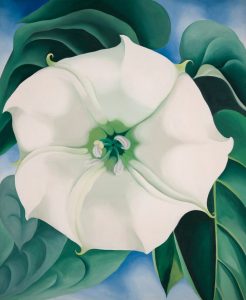 The Yogabliss on-line Moving into Meditation class met this morning. Our class focused on the ways we see ourselves and the world. We drew inspiration from the artist Georgia O’Keeffe who questioned whether anyone really sees a flower. Deep seeing takes time like having a friend. In his talk, Tone and Learning to Be a Good Friend, meditation instructor Oren Jay Sofer also encourages us to befriend ourselves while meditating. The inner atmosphere of acceptance, curiosity and kindness influences the ways we engage the world.
The Yogabliss on-line Moving into Meditation class met this morning. Our class focused on the ways we see ourselves and the world. We drew inspiration from the artist Georgia O’Keeffe who questioned whether anyone really sees a flower. Deep seeing takes time like having a friend. In his talk, Tone and Learning to Be a Good Friend, meditation instructor Oren Jay Sofer also encourages us to befriend ourselves while meditating. The inner atmosphere of acceptance, curiosity and kindness influences the ways we engage the world.
In her book, On Looking: A Walker’s Guide to the Art of Observation, scientist Alexandra Horowitz explores the ways we see the world. What we choose to attend to shapes our very being. After her many walks she observes the most important learning was about the interplay between attention and intention. We ended with two lovely poems drawn from the resources offered by The Network of Grateful Living.
Guided Reflection
The painter and artist Georgia O’Keeffe once said:
Nobody sees a flower – really – it is so small it takes time – we haven’t time – and to see takes time, like to have a friend takes time.
There is a connection between deep seeing – seeing something really and truly – and the need for patience – to give the seeing the quality of friendship. Having a friend takes time . . . it takes time to develop relationship. This speaks to the very essential aspect of the tone that we bring to our meditation practice. What is the tone – the quality of heart and mind – that we are bringing to ourselves?
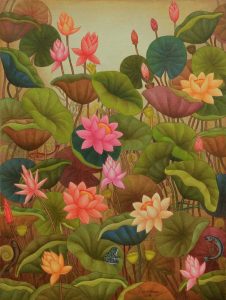 Meditation instructor and author Oren Jay Sofer describes meditation as having
Meditation instructor and author Oren Jay Sofer describes meditation as having
. . . two basic parts: the stabilizing calming and gathering of attention sometimes known as shamatha practice, concentration – the natural settling and gathering of the mind . . . and accessing the second part which is insight, seeing clearly. We need that stable focus in order to see. . .
Giving something the two qualities of time and friendhsip allows us to see. So we bring a quality of kindness and friendship to ourselves as we practice. We become aware of the inner atmosphere we create inside. Right now we can consider our inner atmosphere. Is it one of impatience, ill will, judgment – forcing or pushing – feeling not good enough? Or can we create an atmosphere of inner friendship? Can we accept all parts of ourselves – even those parts that seem to get in the way?
And how does out inner atmosphere influence the way we perceive the world?
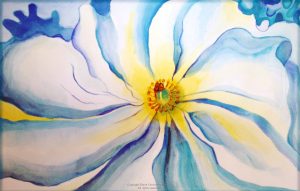 Cognitive scientist Alexandra Horowitz invites us to see the world with “fresh eyes” in her book On Looking: Eleven Walks with Expert Eyes. She writes:
Cognitive scientist Alexandra Horowitz invites us to see the world with “fresh eyes” in her book On Looking: Eleven Walks with Expert Eyes. She writes:
Right now, you are missing the vast majority of what is happening around you. You are missing the events unfolding in your body, in the distance, and right in front of you.
She observes her experience of walking with her dog:
. . . I was paying so little attention to most of what was right before us that I had become a sleepwalker on the sidewalk. What I saw and attended to was exactly what I expected to see; what my dog showed me was that my attention invited along attention’s companion: inattention to everything else.
Together, we became investigators of the ordinary, considering the block — the street and everything on it—as a living being that could be observed. In this way, the familiar becomes unfamiliar, and the old the new.
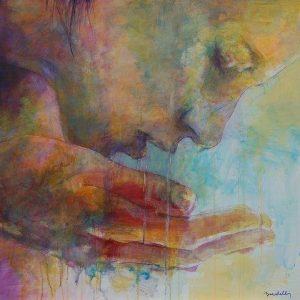 What would happen if we could see what is familiar about ourselves – about our relationships – as uncharted territory – as meeting new friends? Philosopher and psychologist William James wrote: “My experience is what I agree to attend to. Only those items which I notice shape my mind.” What do we consciously attend to? How have our minds been shaped? What matters most to us? What gets in the way?
What would happen if we could see what is familiar about ourselves – about our relationships – as uncharted territory – as meeting new friends? Philosopher and psychologist William James wrote: “My experience is what I agree to attend to. Only those items which I notice shape my mind.” What do we consciously attend to? How have our minds been shaped? What matters most to us? What gets in the way?
Alexandra observes
Part of what restricts us seeing things is that we have an expectation about what we will see, and we are actually perceptually restricted by that expectation.
How often are we blinded by our expectations? What do we miss while looking for what we desire to find – in ourselves, our friends, family, the world?
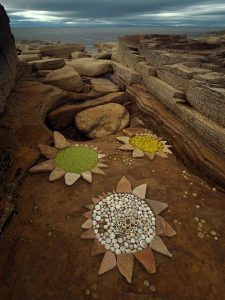 We are limited by our sensory abilities, by our species membership, by our narrow attention — at least the last of which can be overcome.
We are limited by our sensory abilities, by our species membership, by our narrow attention — at least the last of which can be overcome.
But the greatest learning is that our ability to see is a factor of two complementary forces — attention and intention — as the choices we make in what we attend to shape our entire experience of reality.
If imagination is the heart of the mind . . . what is attention . . . what is intention? Perhaps attention is the presence of the heart . . . that part of ourselves that says yes, I will stay with you . . . I will hold you in my heart . . . Perhaps intention is the enabling consciousness of the mind. I will engage life . . . I will bring my heart and mind in purpose . . . in creativity . . . in service . . . in touching the world.
Right now we can recall the last image that drew us in . . . that drew us in so powerfully that it held our hearts and minds . . . perhaps it was a flower . . . a baby’s face . . . an animal in the wild . . . What transpired during that experience of being with? Was time suspended? Did your breathing change? Were emotions stirring?
Here is Teresa Williams poem, Today’s Book of Delights, After Ross Gay:
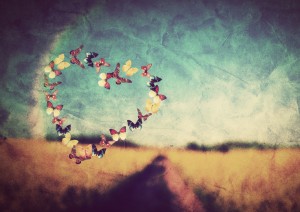 He is right; if we choose to look,
He is right; if we choose to look,
we just might believe it’s there
in the first chirp of the day and the body awakening to hear it,
in the black wings weaving through champagne leaves,
in the spark of coffee with the essay that ends
with the words, renovating love,
for gold snails on the busy sidewalk,
for the elixir of friendship in the dark shell of winter,
for each small note from the universe
and its cheerful persistence, even today,
with a new tumor on the back of my dog’s leg,
to encourage delight
in her oblivious exuberance, and let that be
what sustains me.
What is seen can never be unseen . . . just like our good friends, we carry them with us wherever we go. Our attention and intention enlivened as the choices we make in what we attend to – they shape our entire experience of reality.
Here is Laura Grace Weldon’s poem, You Don’t Know Me But
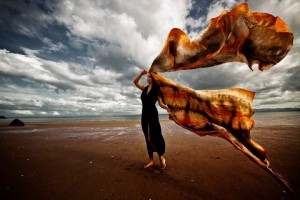 I miss you, fellow walkers – dad with double stroller,
I miss you, fellow walkers – dad with double stroller,
rainbow legging woman, earnest black hound hauling
graybeard man on a never-slack leash.
I miss the Marc’s check-out clerk with three nose rings,
bitten nails, sardonic asides.
Miss the librarian whose voice is soft as my mother’s was
back when I sobbed myself weak, her hand
stroking my hair while she looked out the window.
Wherever you are now, I wish you well. Cast light around you
each night before sleep. I want your granny to pull through,
your job to stick around, your landlord to grant you
every dispensation. I want flowers
to sprout in your garbage, old milk to turn into yogurt.
May your junk mail transform into loans forgiven,
scholarships granted, grievances forgotten.
May we see each other soon, smile in recognition,
reimagine a world where we all breathe free.
